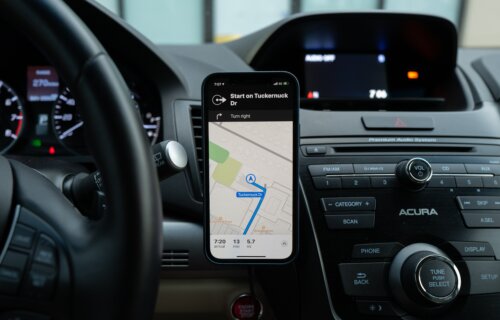LONDON — Navigation apps like Waze and Google Maps make getting from place to place much easier these days, but it turns out the technology really is putting your mind on autopilot. That’s because when you turn GPS on, some parts of your brain essentially turn off, research from the University of College London shows.
Scientists studied 24 volunteers who took part in a simulated drive around the city while having their brains scanned. Of particular interest was activity in the hippocampus, which controls memory and navigation, and the prefrontal cortex, which guides decisions and plans.
“Linking the structure of cities to behaviour has been around since the 1980s, but this is the first study to reveal the impact of that structure on the brain,” says Dr. Beatrix Emo, who led the city street analysis, in a statement.
A previous study led by the university showed pops in activity in these areas of the brain as taxi drivers learn to navigate new roadways and landmarks. When participants in the latest experiment navigated on their own, those findings were confirmed as spikes of activity could be seen in the brain scans.
Yet as soon as the volunteers relied on the vehicle’s GPS device for directions, no activity was seen. Those areas “switched off” when technology took over, the authors explain.
“If you are having a hard time navigating the mass of streets in a city, you are likely putting high demands on your hippocampus and prefrontal cortex,” senior author Dr. Hugo Spiers says in the release. “Our results fit with models in which the hippocampus simulates journeys on future possible paths while the prefrontal cortex helps us to plan which ones will get us to our destination. When we have technology telling us which way to go, however, these parts of the brain simply don’t respond to the street network. In that sense our brain has switched off its interest in the streets around us.”
Spiers and his team also realized that significant brain activity was used when driving through a difficult city to navigate, such as London. Cities like New York, where getting around is fairly simple thanks to the grid-like layout of streets, require less brainpower.
He hopes his findings could lead to making other facets of life easier to navigate, especially for people suffering from conditions that diminish memory or brain activity.
“The next step for our lab will be working with smart tech companies, developers, and architects to help design spaces that are easier to navigate and increase wellbeing,” says Dr Spiers. “Our new findings allow us to look at the layout of a city or building and consider how the memory systems of the brain may likely react. For example, we could look at the layouts of care homes and hospitals to identify areas that might be particularly challenging for people with dementia and help to make them easier to navigate. Similarly, we could design new buildings that are dementia-friendly from the outset.”
The study was published in the journal Nature Communications.
This article was first published on March 23, 2017.
